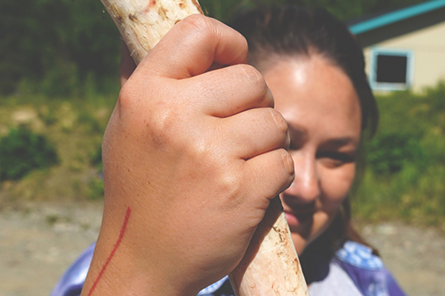
For this Graduate ARTShop Project I was able to meet all my goals with slight adjustments with the delivery of the project to my community. Working in Dgheyey kaq’ (Anchorage) I was able to connect with a small group of hide workers and hide work teachers. To work on hides in a good way we first needed to establish a connection to both our human and animal relatives. This involves building trust within our community of learning and developing deep kinship relations with each other and our knowledge of the animals.
For this project I networked with friends and friends of friends to collect the animal materials from roadkill. I received two hides and four front legs of one moose and one caribou. Creating a virtual group was quite difficult as the spring and summer are primarily reserved for subsistence activities. What I was able to do was have concentrated relation-building and co-learning time with several individuals separately. I plan on continuing to learn about hide work with them.
The Graduate ARTShops Project really helped me continue my journey in hide work. It is a process of learning that requires an integration into one’s life. A truly decolonial approach into learning is understanding that it is a continuum and way of being. I am truly grateful for the support in deepening my relationship to the individuals in this project. As we grow in community so does our collective knowledge and our trust of one another. It is our responsibility to honor these animal relatives through processing their gift in hide work.
This story, from ARTShop Leader Melissa Shaginoff, originally appeared September 17, 2021 under the title “Hide Work in Continuous Community” on the CIRI Foundation website for the series: “A Journey to What Matters and ASCA Partnership – Graduate ARTShops.”
